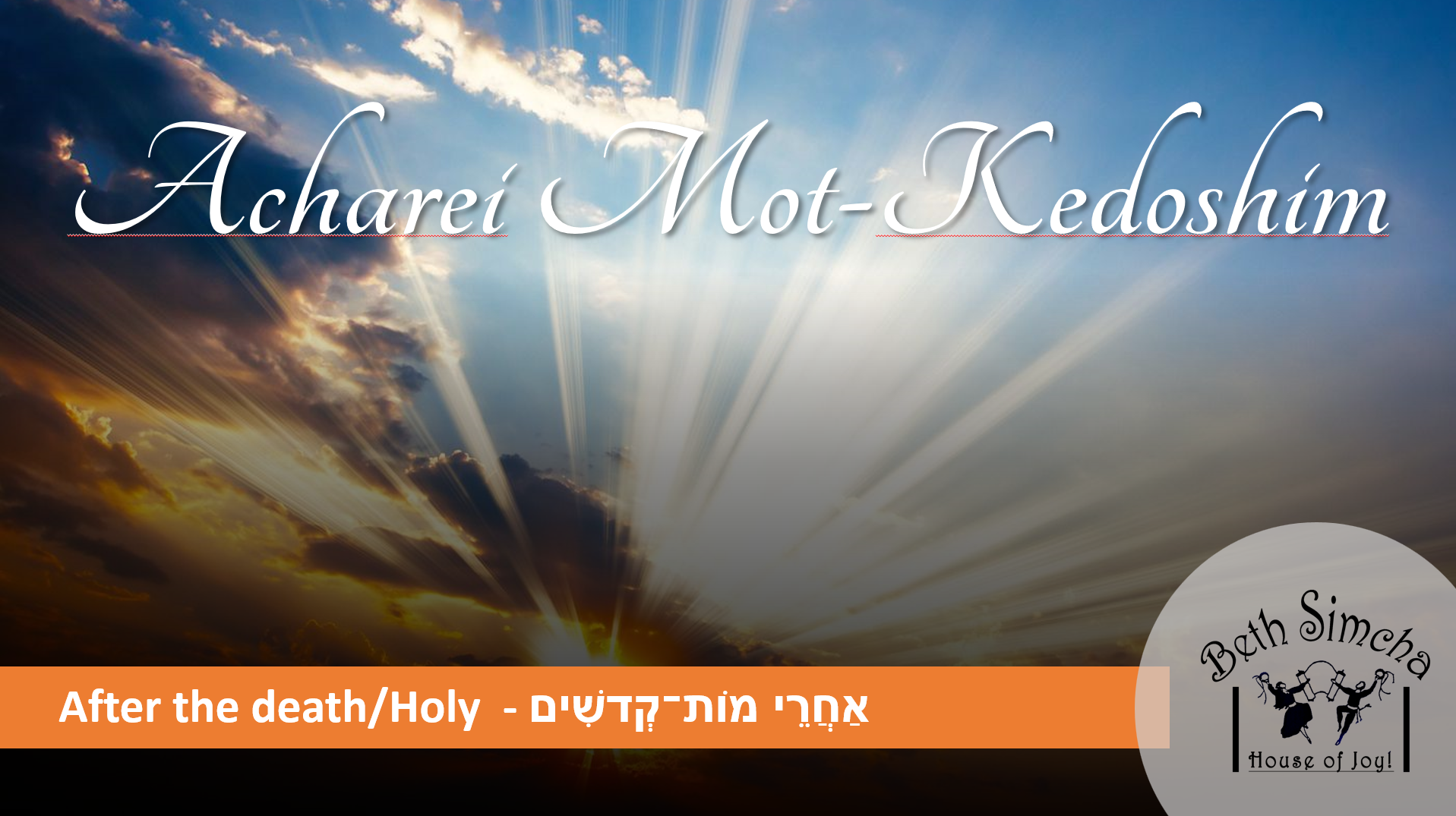| Torah Portion | Haftarah Portion(s) | B'rit Chadashah Portion(s) |
|---|
Leviticus 16.1–20.27 | Amos 9.7-15 | Matthew 15.10-20 |
| Ezekiel 22.1-19 | Hebrews 9.11-28 |
| | 1 Peter 1.13-16 |
| | 1 Corinthians 6.9-20 |
Portion Outline

Torah
Leviticus 16:1 The Day of Atonement
Leviticus 17:1 The Slaughtering of Animals
Leviticus 17:10 Eating Blood Prohibited
Leviticus 18:1 Sexual Relations
Leviticus 19:1 Ritual and Moral Holiness
Leviticus 20:1 Penalties for Violations of Holiness
Prophets
Amos 9:11, The restoring of the tabernacle of David
Ezekiel 22:1, Catalogue of sins in Jerusalem and their dispersion
Ezekiel 22:17, God will burn them as dross in his furnace
Ezekiel 22:23, Corruption of prophets, priests, princes, and people
B'rit Chadashah
Matthew 15:10, what goes into the mouth does not defile a man
Hebrews 9:11, the dignity and perfection of the blood and sacrifice of Christ
1 Peter 1:13, they are now born anew by the word of God
1 Corinthians 6:9, The unrighteous shall not inherit the kingdom of God
1 Corinthians 6:15, Our bodies are the members of Christ - temples
Commentary
Torah Portion Summary
Acharei Mot:The twenty-ninth reading from the Torah and sixth reading from Leviticus is named Acharei Mot, two words that mean "after the death." This portion transitions from the preceding readings regarding ritual purity (tahora) to recall the tragic incident of Nadab and Abihu, the two sons of Aaron who were killed when they offered "strange fire" upon the Altar of Incense during the dedication of the Tabernacle (see Lev. 10:1-2). Because these priests came close to the Holy of Holies in an incorrect manner, the LORD further commanded Moses to instruct Aaron that he should enter the innermost chamber only in a carefully prescribed manner once a year - on the tenth day of the seventh month - during the sacred time called Yom Kippur (i.e., the "Day of Atonement").
On this most solemn day, Aaron was commanded to immerse himself in a mikveh (pool of fresh water) and to dress in all-white linen. He then was instructed to slaughter a bull as a personal sin offering. Aaron then brought some ketoret (incense) to burn within the Holy of Holies before returning to sprinkle the blood of the sin offering seven times before the Ark of the Covenant (i.e., the kapporet or "Mercy Seat"). Aaron repeated this procedure using the blood of one of two goats that was selected (by lot) to be slaughtered as a sin offering on behalf of the people. After this, Aaron took more of the sacrificial blood and purified the Altar of Incense and the other furnishings of the Tabernacle. Later, the fat of these sacrifices was burned on the Copper Altar in the courtyard, though the hide and the flesh were to be entirely burned outside the camp.
After purifying the Tabernacle, Aaron went to the gate of the courtyard and laid both hands upon the head of the other goat (designated "for Azazel," a name for the accusing angel) while confessing all of the sins and transgressions of the people. This "scapegoat" was not slaughtered, however, but was driven away into the wilderness, carrying "all their iniquities unto a land not inhabited." Finally, Aaron returned to the Tent, washed and changed his clothes, and offered two more burnt offerings – one for himself and one for the people – to complete the purification process.
This elaborate ritual was ordained to be a decree for Israel, and the day of Yom Kippur was to be observed every year as a time of "affliction and mourning" for all the people. The portion ends with further instructions about making sacrifices, including the prohibition against offering sacrifices apart from the rites of the Tabernacle. The consumption of blood is explicitly forbidden, since blood was reserved for sacrificial purposes upon the altar.
Kedoshim:Our second Torah portion, called Kedoshim (קדשׁים), provides a series of social and ethical commandments concerning the practical expression of holiness in daily life: "Speak to all the congregation of the people of Israel and say to them, You shall be holy (קדשׁים תהיו), for I the LORD your God am holy" (Lev. 19:2). Indeed this portion lists more mitzvot (commandments) regarding practical ethics (musar) than any other of the Torah, thereby directly connecting the holiness of the community with obedience to God's moral truth.
After stating the requirement to be holy, the LORD begins to explain, "Each of you must respect (i.e., yirah: יִרְאָה) his mother and his father, and you must keep my Sabbaths. I am the LORD your God" (Lev. 19:3). The duty to revere (or honor) one's parents recalls the Fifth Commandment (Exod. 20:12), which is the starting point of learning to respect other people in our lives. Notice that the word for "my Sabbaths" (שַׁבְּתתַי) implies both the keeping of the weekly Sabbath as well as the "appointed times" of the LORD. As we will see, sanctifying time is a way we can express practical holiness in our lives...
Various practical commandments are given in this Torah portion through which a Jew is sanctified, or set apart to be kadosh - holy - and therefore fit for relationship with God. God is not only "wholly Other" (i.e., transcendent) but also pervades all of creation (i.e., "immanent"), and those who are called into His Presence must therefore be holy themselves. Such practical holiness results in sanctification obtained through the observance of commandments (mitzvot). These commandments include both mitzvot aseh (commandments to do something) and mitzvot lo ta'aseh (commandments to refrain from doing something). In addition, chukkim, or "statutes" are given that further separate the Jew from the customs and profanity of the surrounding nations.
